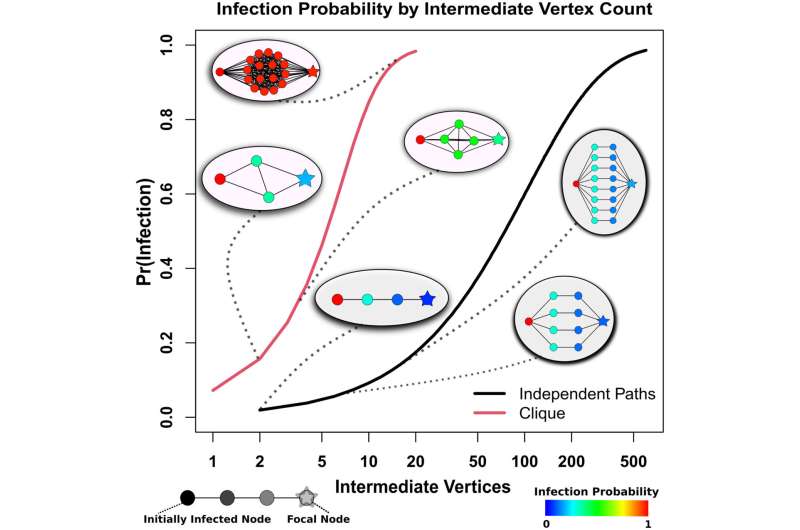[ad_1]

Social cohesion, ordinarily associated with optimistic outcomes in actual physical and mental health and fitness, can be a liability all through a pandemic, in accordance to new investigation by the University of California, Irvine, and the University of Washington.
That’s since social connections—which normally be certain accessibility to assistance, data and resources—can also deliver pathways to an infection, specially for vulnerable people today.
The examine, revealed lately in the Proceedings of the National Academy of Sciences, details to a hidden driver of disparities in the COVID-19 pandemic, specifically amid marginalized communities living in densely populated urban spots.
“With this examine, we wanted to better fully grasp variables that led to distinctions in who turned infected early on in the pandemic,” claims lead creator Loring Thomas, a Ph.D. applicant in sociology at UC Irvine. “Our computational styles discovered that communities whose users belonged to groups that were being, on regular, slightly more cohesive, seasoned a a lot greater infection hazard, in particular prior to non-pharmaceutical interventions like masking ended up common.”
The scientists focused on San Francisco, combining demographic and housing data from the U.S. Census with noticed an infection situations among Black, Latinx, Asian and white racial and ethnic groups. They then utilised computational modeling to understand 1,225 trajectories—or pandemic histories—of person bacterial infections that occurred just before March 24, 2020.
“This paper reveals the electrical power of computational designs to further our knowledge on how small racial/ethnic disparities can outcome in massive true-environment outcomes this kind of as what we have observed in this pandemic’s timing and publicity to COVID-19,” reported co-author Zack Almquist, an assistant professor of sociology at the UW.
A former paper from this investigation team, posted during the initial year of the pandemic, used Census tract demographics, simulation procedures and COVID-19 situation knowledge to take a look at in which and how swiftly the coronavirus could distribute by way of Seattle and 18 other main metropolitan areas. The crew produced a new product of virus diffusion, showing how infection could peak in some neighborhoods faster than many others, based in portion on social and geographic connections.
In drilling down on San Francisco for the latest examine, scientists uncovered that variations in social cohesion amongst demographic groups—the energy of associations and the perception of solidarity amongst associates of a community—as very well as other factors this sort of as housing arrangements, afflicted an infection fees in the pandemic’s first months.
“A essential threat element of early infection through the commencing of the pandemic was not simply possessing various contacts, but being embedded in domestically cohesive areas of the make contact with network—that is, owning numerous contacts in a local community who them selves have many contacts inside that similar group,” stated co-creator Carter Butts, a UC Irvine professor of sociology.
When the details was broken down even more by race and spot, researchers learned that Black and Latinx populations housed in the city’s centre had the maximum infection costs, adopted by Asian and white populace groups.
Butts extra that these final results can also assistance those people making ready for potential emergencies to prioritize warning messages or interventions for significant-risk groups when outbreaks of a most likely serious sickness are initial detected.
Population distribution can drastically affect COVID-19 spread, analyze finds
Loring J. Thomas et al, Geographical patterns of social cohesion generate disparities in early COVID infection hazard, Proceedings of the Countrywide Academy of Sciences (2022). DOI: 10.1073/pnas.2121675119
Citation:
Social cohesion found to be vital chance component in early COVID infections (2022, Might 24)
retrieved 30 May perhaps 2022
from https://medicalxpress.com/information/2022-05-social-cohesion-important-issue-early.html
This doc is topic to copyright. Apart from any reasonable dealing for the objective of personal research or research, no
section may possibly be reproduced with out the penned authorization. The material is offered for facts purposes only.
[ad_2]
Supply website link


More Stories
How Social Sciences Shape Our Modern World
Why Social Sciences Matter More Than Ever
The Hidden Power of Social Sciences in Policy Making